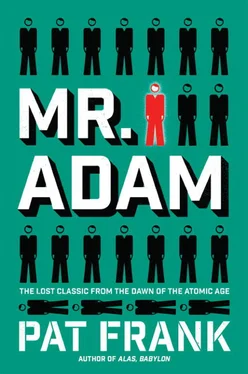Shy as he was, and awkward, standing first on one leg and then on the other like a peculiar species of redheaded crane, Homer sometimes exhibited unexpected spunk and wit. Like when a sly, cynical, harridan from one of the tabloids asked him: “Now, Mr. Adam, not that it’s wrong, but did you and your wife by any chance have premarital relations?”
Homer took a breath and replied, without anger: “You use awfully big words, ma’am. If you mean did we sleep together before we were married, the answer is no.”
She jumped, and the other reporters laughed, and this annoyed her, and she said: “I was only endeavoring to discover whether this child might not have been the result of an exceptionally long pregnancy.”
“That would have been sort of difficult,” said Homer, “because almost up to the very day we were married Mary Ellen was in New York, and I was in Colorado.”
“Well,” said this unwholesome adjective artist, “there is also such a thing as extra-marital relationships!”
I had the answer to that one, but I wanted to see the creature hang herself, so for the moment I remained quiet. Homer stood very still, his long, bony hands white and twisting, and no color in his face. Then Mike Burgin, from the Times , said: “Look, madame”—and the way he pronounced “madame” left no doubt as to what sort of madame he meant—“I think you are out of line, and anyway this kid has already got red hair just like her father.”
“My desk,” the dough-faced witch alibied, “told me to ask.”
“Well, just so your desk will not work itself into a lather,” I interrupted, “tell your desk that we have already run complete blood tests, and Homer Adam is undoubtedly the pappy.”
After the press was reasonably satisfied, the Army moved in. The American Army, when it has a war to fight, is an aggressive, eager, brainy, and enormously efficient organization. But when there is no war, the Army is something less than that. I suspect that its higher echelons are staffed, except for the professional soldiers, by gentlemen fearful of facing the competition of civilian life, officers to whom the barracks has become a nice, safe refuge.
The Army moved in first, with a platoon of Military Police dispatched from Fort Totten, after the Tarrytown Police Department, overworked and bewildered, sent out urgent distress signals. The MP’s found a job to do, and they did it. They kept traffic moving outside the estate, and they shooed away the over-inquisitive who climbed fences, and sometimes frightened Mrs. Brundidge by staring through the kitchen windows, bug-eyed, while she mixed Eleanor’s formula.
Perhaps their most arduous and interesting chore was acting as buffers, between Homer Adam and the teen-age girls who had, en masse, deserted a crooner known as “The Larynx,” and a screen actor called “The Leer.” Why it was no man can explain, but the photographs of Homer Adam definitely registered sex appeal to excitable, half-matured, single females. Until the MP’s established a cordon sanitaire around the estate, their uninhibited tactics frightened Homer into the shakes, alarmed Mary Ellen, and disturbed the baby’s digestion. They shocked Homer into the shattering knowledge that he was no longer—and probably never would be again—a private citizen enjoying the Fifth Freedom—Privacy.
But with the arrival of Colonel Merle Phelps-Smythe at Rosemere, Homer began to understand fully his future role in the national, and possibly the world scene.
Homer and I were playing gin and Blandy was kibitzing when the colonel put his riding boots and spurs through the door. “Who’s in charge here?” he boomed. “I’m here to see Mr. Adam!”
“Why nobody’s in charge,” Homer said, rising derrick-like, “but I’m Adam.”
“Well, now, that’s why I’m here,” Phelps-Smythe explained. “I’m here just exactly for that reason—because nobody’s in charge. That’s why the Army sent me to take over.” He stated his name with some formality, and added: “I am the personal aide and Public Relations Officer of the Commanding General, Eastern Defense Command, Zone of the Interior. From now on”—he poked a fat forefinger at Homer’s throat—“you are under the protection of the Eastern Defense Command. General Kipp is personally responsible for your safety, and I am personally responsible to General Kipp.”
He glared at Blandy and me as if he had just, single-handed and above and beyond the call of duty, saved Homer Adam from violence at our hands. I glared back. There is nothing a Smith abhors so thoroughly as a hyphenated Smythe.
I would not have liked this hyphenated Smythe in any case. He had, somehow, without the aid of a single combat decoration, made his chest resemble a triple rainbow. He wore the Victory Ribbon from that old war, the pre-Pearl Harbor ribbon, and the American, European, and Asiatic Theater ribbons. But since no battle stars bloomed on these ribbons, they appeared to me like the gaudy hotel stickers that the tourists of the thirties exhibited on their luggage after doing Europe in three weeks. In addition, he wore various exotic decorations that I vaguely associated with Uruguay, the Dominican Republic, and the World’s Fair. Under these, dangled ladders of shooting badges, indicating that he was a second-class pistol shot from the back of a horse, and a fair to middling rifle shot, prone. There was an unidentified sunburst on the right side of his stomach, just where the fat would be oozing out from under the ribs, had it not been for his obvious girdle.
“How,” I inquired, “does the Eastern Defense Command go about taking over Mr. Adam?”
“In the first place—” the Colonel began, and then said: “You’re that AP man who has been messing up the publicity. Who authorized you to be here anyway?”
“Me,” said Homer meekly. “I did.”
Blandy laughed. “And isn’t this Mr. Adam’s house?” he asked.
For a moment Phelps-Smythe was repulsed by this unexpected show of resistance, but he quickly recovered.
“In the first place,” he said, “perhaps you do not know it, but the Joint Chiefs of Staff have decided, in the national interest, that Mr. Adam is vital, strategic government property. The Joint Chiefs felt themselves authorized in making this decision on the basis of future national defense.”
“Congress,” logically concluded Dr. Blandy, “has been demanding that the Administration do something about poor Homer, here, and that was the only thing they could think up to do.”
Homer sat down, his mild blue eyes blinking. “But I don’t wish to be taken over,” he protested. “I just want to be left alone with Mary Ellen and the baby. Is it my fault that all the rest of you are sterile?”
Phelps-Smythe put his hand on Homer’s drooping shoulder. “Now, my boy,” he said, “remember this is in the national interest. Consider—you are just as much a military secret as the atomic bomb.”
“Please don’t mention atomic bombs,” I said, remembering what Mississippi had done to our future, “I’m allergic to them.”
“Besides,” the colonel went on, ignoring me, “your wife and child will be taken care of until the present emergency is over. Funds have already been provided.”
“I’m not going to leave Mary Ellen and the baby!” said Homer with some determination. “That, I simply won’t do!”
“You won’t have to leave immediately. You don’t have to go to Washington until the hearings.”
“What hearings?”
“The Congressional hearings on what to do with you. You see, the Joint Chiefs have simply declared you are vital and strategic. The War Department was entrusted with your safety, and my commanding general was given the job. But your final disposition will not be decided until after the Congressional hearings.”
Читать дальше












